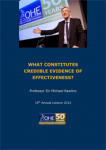Since 1993, OHE has hosted an annual lecture given by an eminent economist or clinician on an important current issue. In 2012, Professor Sir Michael Rawlins…
Since 1993, OHE has hosted an annual lecture given by an eminent economist or clinician on an important current issue. In 2012, Professor Sir Michael Rawlins spoke on challenges and concepts in developing evidence of effectiveness.

Since 1993, OHE has hosted an annual lecture given by an eminent economist or clinician on an important current issue. In 2012, Professor Sir Michael Rawlins spoke on challenges and concepts in developing evidence of effectiveness. The publication based on his lecture now is available for download for registered use of this website.
In the monograph based on his presentation at the 19th OHE Annual Lecture, Professor Sir Michael Rawlins examines the issues surrounding standards of proof required to show the effectiveness of a medical therapy. He traces the historical development of inductive and deductive approaches in science, discussing the strengths and weaknesses of each as applied to medicine.
Sir Michael expresses concern that some view randomised controlled trials (RCTs) as the “gold standard” of evidence. RCTs, he argues, are very important, but other approaches to evidence development can prove equally valid in some circumstances. The primacy accordedt to RCTs is clear in “hierarchies” of evidence that have becomes common, some exceedingly elaborate. Sir Michael expresses concern about formulaic reliance on hierarchies as a substitute for careful judgement: “It is judgement, conditioned by the totality of the evidence base, that lies at the heart of decision-making.”
Download Rawlins, M. What constitutes credible evidence of effectiveness? 19th OHE annual lecture. London: Office of Health Economics.
The 2013 OHE Annual Lecture, scheduled for 16 July, will address quality in the NHS and be given by Professor Alan Maynard. For details and to register, please click here.